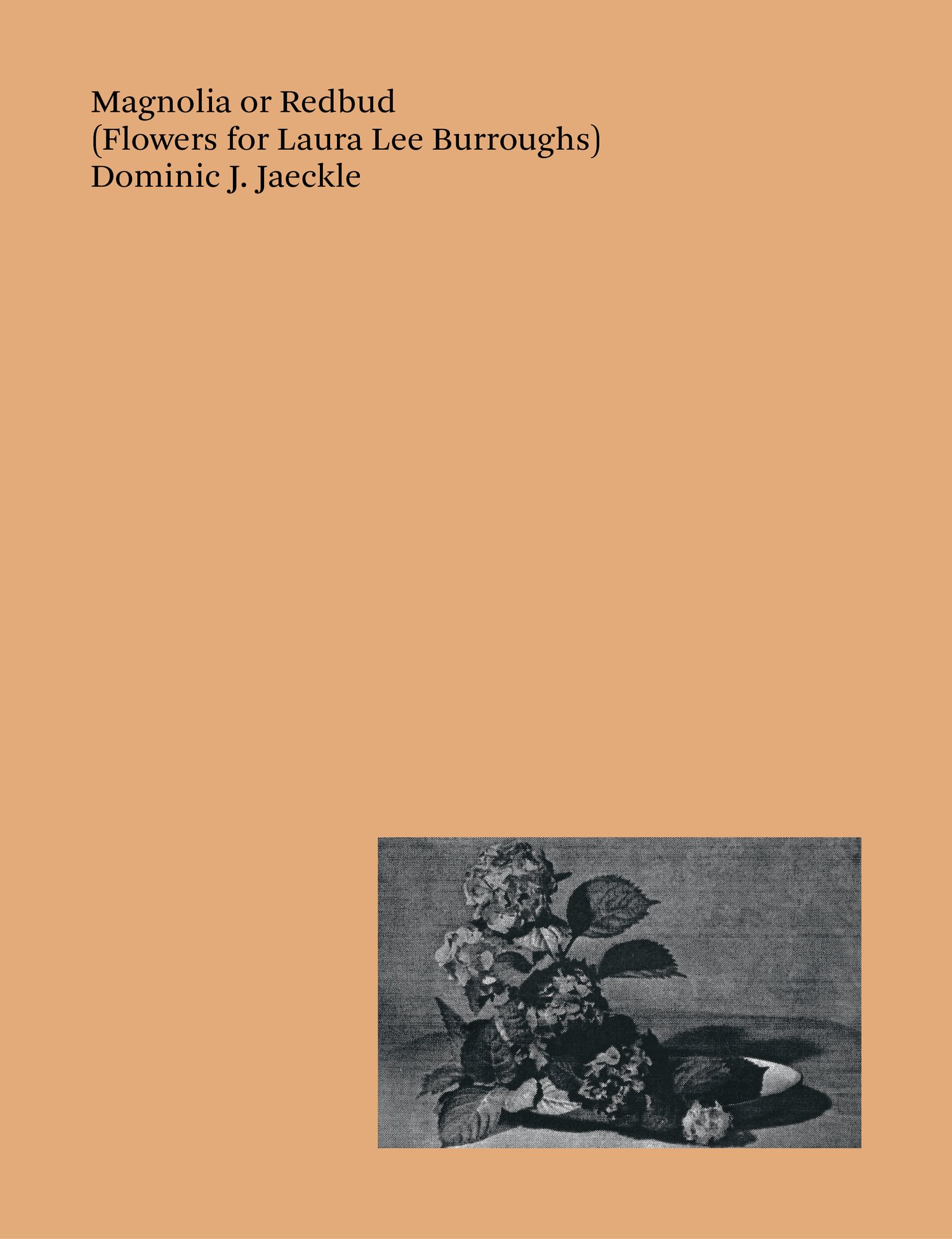
Dominic J. Jaeckle, Magnolia or Redbud (Flowers for Laura Lee Burroughs)
£17.50
With an afterword by David Keenan,
& collage works by Lucy Sante
Tenement Press /John Cassavetes
ISBN: 978-1-7393851-2-5
188pp / 140 x 216mm
Designed and typeset by Traven T. Croves
31.07.24
Veronica Lake, Walden Pond, & River Phoenix II
•
In the late 1930s, The Coca-Cola Company aimed to spearhead a campaign to better establish their product as a household staple and enrapture the middle-class homemaker’s market. A Trojan horse, the resulting promotion was run through the distribution of a ¢10 mail-order publication via Good Housekeeping on flower arrangement. Three illustrated editions, authored by St. Louis resident Laura Lee Burroughs, that would explore the practice of domestic and decorative horticulture as a means of sitting a bottle side-by-side with a bouquet: Flower Arranging: A Fascinating Hobby (Volume I and II) and Homes & Flowers: Refreshing Arrangements.
In 1940, the first of Burroughs’ works was offered to the public to a thunderous reception. More than a million and a half copies were printed to meet the degree of demand, and a second and third volume would follow in 1941 and 1942. Following the first outdoor wall advertisement for Coca-Cola—a hand painted sign Cartersville, Georgia, 1894—the replacement of the spring-sealed Hutchinson bottle with the signature hobble-skirt design of 1915, and the company’s fiftieth anniversary celebrations, 1935, the campaign cemented Coca-Cola’s market centrality and enflamed its suburban appeal.
Mother of author William S. Burroughs, Laura Lee’s work sits as in poetic counterpoint to her son’s subsequent experiments with collage and cut-up—a formal flower arrangement of his own—and the poems collected in Magnolia or Redbud mimic the Burroughs brand of appropriation and textual re-combination by borrowing words and phrases pooled exclusively from Laura Lee’s three publications for Coca-Cola as a basis from which to essay an afterwork out of the family habit.
•
See here for a further word on this title.
•
My mother returning to me is one of the primal images of my life. Added to all this, I could not help marvelling, is what booksellers call a sort of brogue. These are all part and parcel of this precious book, which go to make up the sum of its treasure to me...
David Keenan,
the opening lines of his Afterword,
‘Redbud, or Her First Voyage’
Dominic Jaeckle’s strange homage—is it really?—to William S. Burroughs’s mother Laura Lee takes the form of poetic assemblages that are invariably funnier and more subversive than the language of their anodyne source material would suggest. But this beautifully composed volume also goes beyond the more familiar uses of the cut-up, fashioning an unpredictable array of gifts through its trance-like modalities: These perishable arrangements / are the needle that holds our colder climates together.
David Grubbs
•
Dominic J. Jaeckle is a writer, editor, and publisher. Jaeckle curated and collated the irregular magazine series Hotel and its adjacent projects, and publishes works of experimental and esoteric literature in English and in first-time English language translarion via Tenement Press.
Lucy Sante’s books include Low Life (Farrar, Straus and Giroux, 2003), Kill All Your Darlings (Verse Chorus Press, 2007), The Other Paris (Farrar Straus & Giroux, 2015), Maybe the People Would Be The Times (Verse Chorus Press, 2020), and the memoir, I Heard Her Call My Name (Heinemann, 2024).
David Keenan is the author of five critically acclaimed novels; the cult classic, This is Memorial Device (Faber & Faber, 2018), which won the London Magazine Prize; For the Good Times (Faber & Faber, 2019), which won the Gordon Burn Prize; The Towers The Fields The Transmitters (White Rabbit, 2020), Xstabeth (White Rabbit, 2020) and Monument Maker (White Rabbit, 2021), which was a Rough Trade Book of the Year. He lives in Glasgow, Scotland.
•
Magnolia or Redbud is a manuscript owing to an ongoing project called Veronica Lake, Walden Pond, & River Phoenix—a cumulative train of thought, a series of spines, a ‘Legend of Duluoz’ in which the author argues with objects of interest in a borderless field of enquiry.